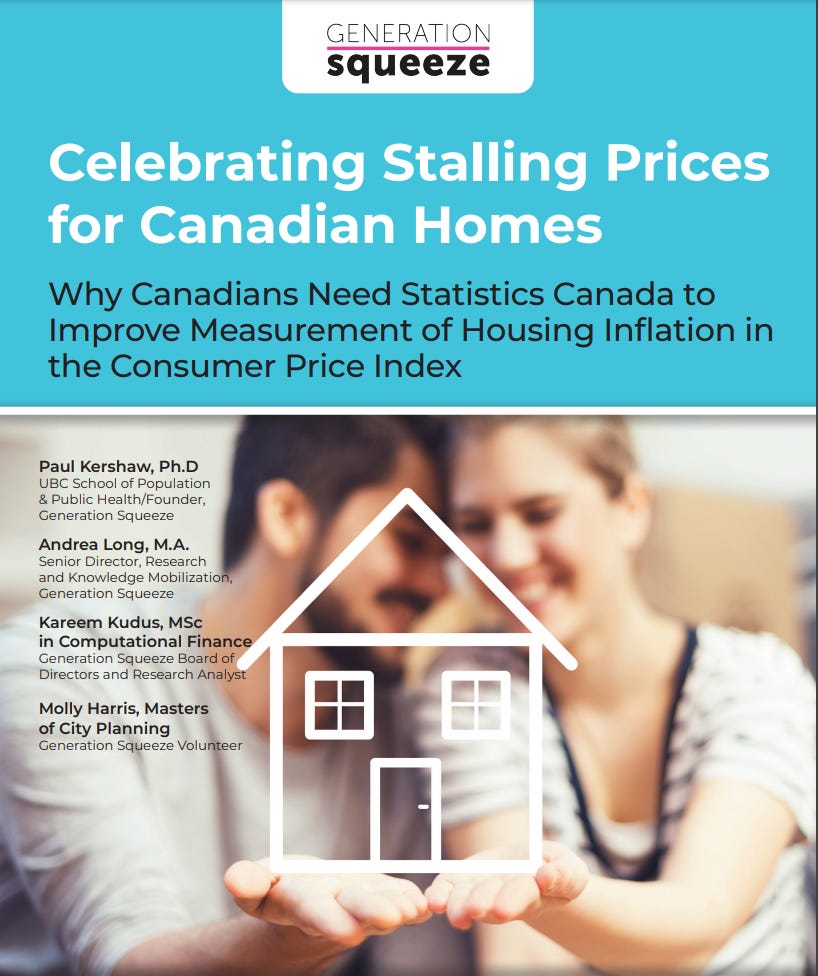A New Report and Podcast Episode on Canadian Housing Affordability
The evidence is in: Expensive coffee habits are not what's preventing young people from buying homes
Slow day at work? Why not read through a new report by Generation Squeeze that I co-authored?
50+ pages, of in-depth analysis about Canadian housing (un)affordability doesn’t sound like fun? Luckily, you subscribe to this newsletter where I’ve put together a summary!
The report, “Celebrating Stalling Prices for Canadian Homes”, delves into an important question: Which direction do we want to see property values go in the future?
Home prices in Canada had been rising relentlessly for many years until higher interest rates cooled the market this year. Some see this as a bad thing since it negatively impacts homeowners' finances. Others, who are concerned about affordability, are thrilled that prices have stopped climbing.
As you might have gathered from the title, the conclusion of the report is that as a nation we should be celebrating stalling home prices, and hoping that it’s a long time until they rise again. The recent slowdown is a big first step towards more affordable housing and provides proof that we aren’t powerless over our housing market.
For so long it seemed inevitable that property values would keep rising no matter what we did to try and slow them. The recent cooling of the market makes clear that we do in fact have the necessary policy tools to influence home prices, we just hadn’t been using them.
As we discussed last time, interest rates should’ve been used to cool the housing market many years ago, but weren’t because of flaws in our inflation measurement system. Imagine how different of a situation we would be in if this slowdown happened before things got so out of control!
We didn’t decide to subtitle the report “Why Canadians need Statistics Canada to improve measurement of housing inflation in the consumer price index” because it sounds pretty. It’s crucial that we fix our inflation measurement system so that interest rates are used to slow the housing market when appropriate going forward.
Another goal of this report was to shed some light on what has happened to affordability over the years. We know it has worsened, but how bad are things really?
Here are a few key points:
In 1976 it took a typical Canadian 5 years to save up for a 20% down payment. Today it would take 17 years on average throughout the country, and close to 30 years in more expensive areas like the GTA.
A pervasive myth is that young people would be able to afford a home if they spent less on indulgences like fancy coffee. In reality, one has to save $120 dollars every day for 5 years to have enough for a downpayment on the average home in the GTA. That’s the equivalent of twenty-four $5 lattes a day. I don’t know many people who have that much money left over after paying their rent, never mind wasting it on coffee.
For a typical young person to afford a mortgage at current interest rates average Canadian home prices would need to fall $341,000 (half of their 2021 value) or average full-time earnings would need to increase to $108,000/year (double the current levels).
If you find this stuff interesting, then I think you will enjoy listening to the below podcast episode, where I discuss the report in more detail with the other authors.
As I mention in the podcast, making Canadian housing more affordable will require a shift in our collective mindset away from houses as investments. We need to prioritize People, and their need for a safe, stable, and affordable housing arrangement, instead of Profits, as we currently do, where houses are used to produce a steady stream of income or as a retirement fund.
In the podcast, we also chat about how the first step toward change is getting everyone on the same page. We need to agree on the root causes of our problems, along with the optimal solutions, before we can make any progress.
I hope that you think this report and podcast from Generation Squeeze provide some valuable information. If you do, please consider sharing this newsletter, or any of the information in it, with your friends and family.
That’s it for this edition of People Over Profits. As always, any feedback is much appreciated.
Thanks for reading!

